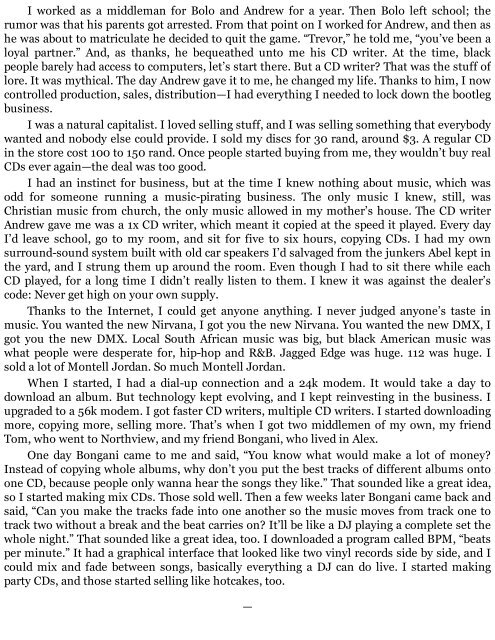Create successful ePaper yourself
Turn your PDF publications into a flip-book with our unique Google optimized e-Paper software.
I worked as a middleman for Bolo and Andrew for a year. Then Bolo left school; the<br />
rumor was that his parents got arrested. From that point on I worked for Andrew, and then as<br />
he was about to matriculate he decided to quit the game. “Trevor,” he told me, “you’ve been a<br />
loyal partner.” And, as thanks, he bequeathed unto me his CD writer. At the time, black<br />
people barely had access to computers, let’s start there. But a CD writer? That was the stuff of<br />
lore. It was mythical. The day Andrew gave it to me, he changed my life. Thanks to him, I now<br />
controlled production, sales, distribution—I had everything I needed to lock down the bootleg<br />
business.<br />
I was a natural capitalist. I loved selling stuff, and I was selling something that everybody<br />
wanted and nobody else could provide. I sold my discs for 30 rand, around $3. A regular CD<br />
in the store cost 100 to 150 rand. Once people started buying from me, they wouldn’t buy real<br />
CDs ever again—the deal was too good.<br />
I had an instinct for business, but at the time I knew nothing about music, which was<br />
odd for someone running a music-pirating business. The only music I knew, still, was<br />
Christian music from church, the only music allowed in my mother’s house. The CD writer<br />
Andrew gave me was a 1x CD writer, which meant it copied at the speed it played. Every day<br />
I’d leave school, go to my room, and sit for five to six hours, copying CDs. I had my own<br />
surround-sound system built with old car speakers I’d salvaged from the junkers Abel kept in<br />
the yard, and I strung them up around the room. Even though I had to sit there while each<br />
CD played, for a long time I didn’t really listen to them. I knew it was against the dealer’s<br />
code: Never get high on your own supply.<br />
Thanks to the Internet, I could get anyone anything. I never judged anyone’s taste in<br />
music. You wanted the new Nirvana, I got you the new Nirvana. You wanted the new DMX, I<br />
got you the new DMX. Local South African music was big, but black American music was<br />
what people were desperate for, hip-hop and R&B. Jagged Edge was huge. 112 was huge. I<br />
sold a lot of Montell Jordan. So much Montell Jordan.<br />
When I started, I had a dial-up connection and a 24k modem. It would take a day to<br />
download an album. But technology kept evolving, and I kept reinvesting in the business. I<br />
upgraded to a 56k modem. I got faster CD writers, multiple CD writers. I started downloading<br />
more, copying more, selling more. That’s when I got two middlemen of my own, my friend<br />
Tom, who went to Northview, and my friend Bongani, who lived in Alex.<br />
One day Bongani came to me and said, “You know what would make a lot of money?<br />
Instead of copying whole albums, why don’t you put the best tracks of different albums onto<br />
one CD, because people only wanna hear the songs they like.” That sounded like a great idea,<br />
so I started making mix CDs. Those sold well. Then a few weeks later Bongani came back and<br />
said, “Can you make the tracks fade into one another so the music moves from track one to<br />
track two without a break and the beat carries on? It’ll be like a DJ playing a complete set the<br />
whole night.” That sounded like a great idea, too. I downloaded a program called BPM, “beats<br />
per minute.” It had a graphical interface that looked like two vinyl records side by side, and I<br />
could mix and fade between songs, basically everything a DJ can do live. I started making<br />
party CDs, and those started selling like hotcakes, too.<br />
—
















